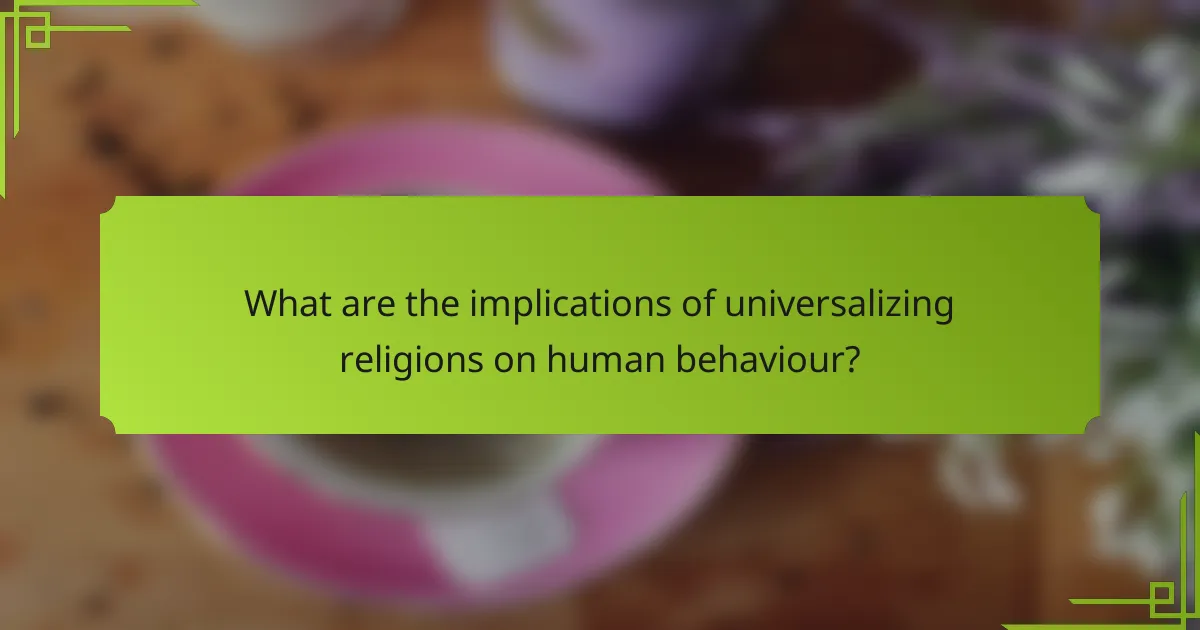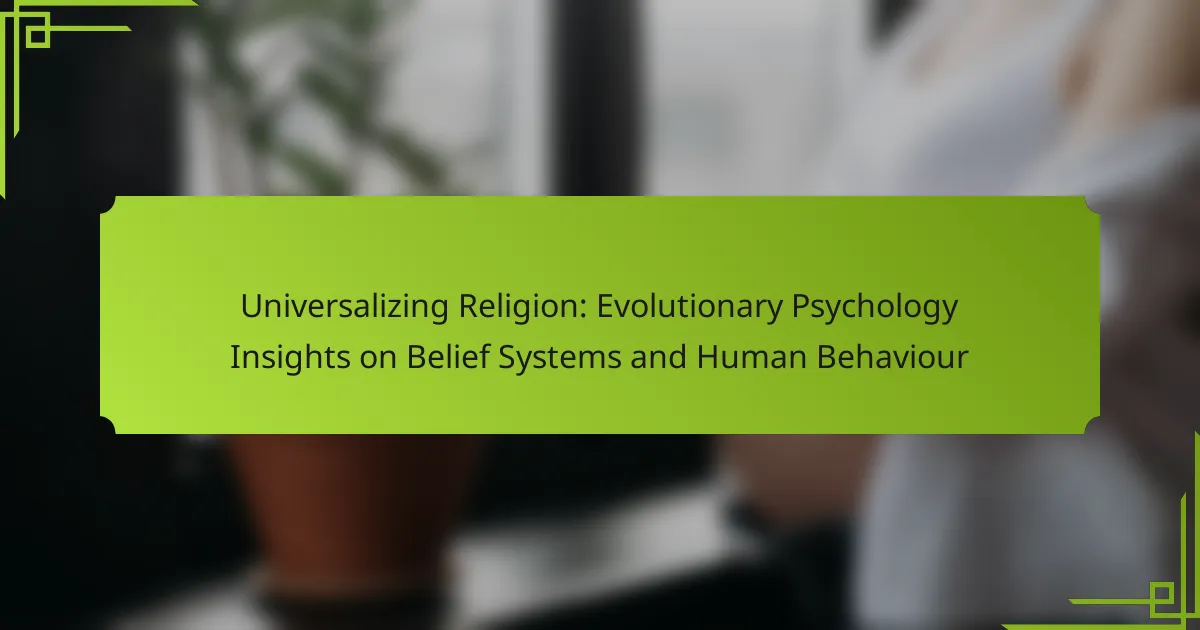Universalizing religions play a crucial role in shaping human behaviour and social dynamics. This article explores their core attributes, including inclusivity and adaptability, and examines how evolutionary psychology informs their spread. It also delves into the impact of these religions on altruism, community engagement, and moral frameworks. Finally, the discussion highlights the importance of interdisciplinary collaboration between psychology and theology to enhance our understanding of these belief systems.

What are the foundational principles of universalizing religions?
Universalizing religions aim to spread their beliefs globally and appeal to diverse populations. Foundational principles include inclusivity, adaptability, and a focus on universal values. These religions often emphasize the significance of personal experience and community, fostering a sense of belonging. Additionally, they promote moral frameworks that guide behaviour and encourage social justice, aligning with human psychological needs for connection and meaning.
How do universalizing religions differ from ethnic religions?
Universalizing religions seek to spread their beliefs globally, while ethnic religions are tied to specific cultural groups. Universalizing religions, such as Christianity and Islam, emphasize inclusivity and adaptability, often promoting missionary work. In contrast, ethnic religions, like Hinduism and Judaism, focus on cultural identity and heritage, often limiting their appeal to specific communities. The intent behind universalizing religions is to attract followers worldwide, whereas ethnic religions prioritize maintaining traditions and cultural practices within defined boundaries.
What role does evolutionary psychology play in understanding belief systems?
Evolutionary psychology helps explain belief systems by revealing their adaptive functions in human behaviour. It posits that religious beliefs may enhance social cohesion and cooperation among groups, promoting survival. This perspective suggests that universalizing religions evolved to address fundamental human needs for meaning and community. Additionally, evolutionary psychology highlights how cognitive biases, such as pattern recognition, influence the formation of belief systems. Understanding these insights can illuminate the underlying mechanisms driving human behaviour and societal structures related to religion.
What are the core psychological mechanisms behind religious beliefs?
The core psychological mechanisms behind religious beliefs include cognitive biases, social cohesion, and existential comfort. Cognitive biases, such as the tendency to see patterns or agency in random events, reinforce belief systems. Social cohesion fosters community bonds, enhancing group identity. Existential comfort provides meaning in life, addressing fears of mortality. These mechanisms work together to shape and sustain religious beliefs across cultures.
How do cognitive biases influence religious adherence?
Cognitive biases significantly shape religious adherence by influencing belief formation and reinforcement. Confirmation bias leads individuals to seek information that supports their existing beliefs, while the bandwagon effect encourages conformity to group norms. These biases foster a sense of belonging and validation within religious communities, enhancing commitment. Additionally, cognitive dissonance can prompt believers to rationalize conflicting information, further entrenching their faith. Understanding these psychological mechanisms reveals how deeply intertwined cognition and spirituality are in shaping human behaviour.

What universal attributes characterize belief systems in universalizing religions?
Universalizing religions share several universal attributes that shape their belief systems. These include a focus on inclusivity, the promotion of universal truths, and the aspiration for global reach.
Inclusivity allows these religions to embrace diverse cultures and communities, fostering a sense of belonging. Universal truths, such as moral principles and ethical guidelines, provide a common framework that transcends local customs. The aspiration for global reach encourages missionary activities, spreading beliefs beyond geographical boundaries.
Root attributes of universalizing religions often involve a strong emphasis on salvation and personal transformation, appealing to individual experiences. Unique attributes can include specific rituals or practices that reinforce community identity. Rare attributes may manifest as distinctive theological concepts that set them apart from other belief systems.
These characteristics collectively influence human behaviour, shaping social dynamics and individual choices within a broader cultural context.
How do social cohesion and community support manifest in these religions?
Social cohesion and community support manifest in universalizing religions through shared beliefs and practices that foster unity. These religions often emphasize collective rituals, communal worship, and outreach programs that strengthen social bonds. For example, many universalizing religions promote charitable acts, enhancing community ties and mutual support among followers. This unique attribute of fostering community is essential for psychological well-being and belonging, reinforcing the social fabric.
What are the common rituals and practices across universalizing religions?
Common rituals and practices across universalizing religions include prayer, pilgrimage, and communal worship. These activities foster a sense of belonging and shared belief among adherents.
Prayer serves as a personal and communal connection to the divine, often performed multiple times daily. Pilgrimage, such as the Hajj in Islam, symbolizes devotion and commitment to faith. Communal worship, found in Christianity and Buddhism, strengthens community ties and reinforces shared values.
These practices illustrate how universalizing religions adapt to human psychological needs, promoting social cohesion and individual fulfilment.

What unique attributes set universalizing religions apart?
Universalizing religions are distinguished by their inclusivity, proselytization, and adaptability. These religions actively seek to convert individuals regardless of cultural background, emphasizing a universal message. Their ability to adapt to various cultures while maintaining core beliefs allows them to resonate with diverse populations. Unique attributes include a global outreach strategy, a strong emphasis on community building, and a focus on moral and ethical principles that transcend local customs.
How do universalizing religions promote inclusivity and global outreach?
Universalizing religions promote inclusivity and global outreach by emphasizing shared beliefs and values. They often adapt their teachings to resonate with diverse cultures, fostering a sense of belonging among followers. These religions prioritize community engagement, encouraging outreach efforts that transcend geographical and cultural boundaries. By embracing pluralism, they create spaces for dialogue and understanding, which enhances their global presence. Their missionary activities further exemplify this commitment, as they actively seek to connect with individuals from various backgrounds, promoting a universal message of unity.
What are the distinct narratives and teachings that define these religions?
Universalizing religions share distinct narratives and teachings that emphasize universal truths and human connection. These religions often focus on the inherent dignity of all individuals, promoting values such as compassion, justice, and community.
Key narratives include creation stories that explain the origins of humanity and the universe, moral teachings that guide ethical behaviour, and eschatological views that outline beliefs about the end of times or ultimate purpose. For example, Christianity emphasizes salvation through faith, while Buddhism teaches the path to enlightenment through mindfulness and compassion.
These teachings often adapt to cultural contexts, illustrating the unique attribute of flexibility within universalizing religions. This adaptability allows for a diverse range of practices and interpretations that resonate with various populations, enhancing their relevance in different societies.
Overall, the narratives and teachings of universalizing religions reflect a shared human experience, aiming to unite people across differing backgrounds through common values and beliefs.

What rare attributes can be observed in specific universalizing religions?
Universalizing religions exhibit rare attributes that highlight their unique characteristics. These include a strong emphasis on missionary work, which distinguishes them from ethnic religions. Additionally, they often possess a universalizing doctrine that transcends cultural boundaries, promoting inclusivity. Another rare attribute is the adaptability of beliefs and practices to various cultural contexts, allowing them to resonate with diverse populations. Lastly, universalizing religions frequently emphasize a personal relationship with the divine, encouraging individual spiritual experiences over communal rituals.
What unusual belief systems have emerged in response to modern challenges?
Unusual belief systems have emerged as adaptive responses to modern challenges, reflecting humanity’s evolving needs. These systems often prioritize community, sustainability, and personal well-being. For example, eco-spirituality combines environmentalism with spiritual practices, addressing ecological crises. Another emerging belief is digital spirituality, where individuals find meaning through online communities and virtual connections. These adaptations showcase a unique attribute of contemporary belief systems: their capacity to integrate technology and social awareness into spiritual frameworks. As a result, they offer new avenues for coping with existential threats and societal changes.
How do certain universalizing religions adapt to cultural integration?
Universalizing religions adapt to cultural integration by embracing local customs while maintaining core beliefs. This flexibility allows them to resonate with diverse populations. For instance, they often reinterpret rituals to align with local traditions, fostering acceptance. This adaptability enhances their appeal, promoting growth and sustainability. As a result, universalizing religions can thrive in various cultural contexts, demonstrating their evolutionary psychology insights on belief systems.

How does evolutionary psychology explain the spread of universalizing religions?
Evolutionary psychology suggests that universalizing religions spread due to their ability to enhance social cohesion and cooperation among large groups. These belief systems often promote moral frameworks that encourage altruistic behaviour, which can improve group survival.
The concept of “in-group versus out-group” dynamics plays a crucial role in this phenomenon. Universalizing religions often provide a strong identity and sense of belonging, facilitating cooperation among adherents while fostering competition with non-believers.
Additionally, the adaptability of these religions allows them to integrate diverse cultural practices, making them appealing across various societies. They often emphasize missionary work, which actively seeks to convert others, further spreading their influence.
In summary, evolutionary psychology highlights how universalizing religions leverage social mechanisms to enhance group cohesion, promote altruism, and adapt to different cultural contexts, driving their widespread adoption.
What psychological factors contribute to the conversion process?
Psychological factors such as cognitive dissonance, social identity, and emotional appeal significantly influence the conversion process in universalizing religions. Cognitive dissonance occurs when individuals experience discomfort from conflicting beliefs, prompting them to seek alignment with new belief systems. Social identity plays a crucial role as people often convert to feel a sense of belonging within a community. Emotional appeal, driven by personal experiences and narratives, can also lead to transformative belief changes. These factors collectively shape how individuals perceive and adopt new religious ideologies.
How do social networks facilitate the dissemination of religious beliefs?
Social networks significantly enhance the spread of religious beliefs by facilitating rapid communication and community engagement. These platforms allow users to share personal experiences, beliefs, and practices, creating a sense of belonging. As a result, individuals are more likely to adopt and disseminate these beliefs within their networks.
The visual and interactive nature of social networks engages users effectively. Content such as videos, images, and live discussions captures attention and promotes deeper understanding of religious concepts. This engagement fosters emotional connections, which are crucial in belief formation.
Social networks also enable targeted outreach. Religious organizations can tailor their messages to specific demographics, increasing relevance and resonance. This strategic communication amplifies the impact of their beliefs, making them more accessible to diverse audiences.
Moreover, the global reach of social media allows for cross-cultural exchanges of religious ideas. Users from different backgrounds can share perspectives, enriching the understanding of various belief systems. This exchange can lead to the evolution of beliefs and practices as they adapt to new contexts.

What are the implications of universalizing religions on human behaviour?
Universalizing religions significantly shape human behaviour by promoting shared values and social cohesion. They encourage altruism, community engagement, and moral frameworks that align with collective well-being. Research indicates that adherence to universalizing religions can enhance prosocial behaviours, reducing conflict and fostering cooperation among diverse groups. These religions often emphasize inclusivity, which can lead to broader social networks and increased empathy. Consequently, the implications of universalizing religions on human behaviour are profound, influencing individual actions and societal norms.
How do these religions influence moral decision-making?
Universalizing religions significantly shape moral decision-making by providing a framework of values and ethical guidelines. These religions often emphasize principles such as compassion, justice, and community welfare, influencing adherents’ choices in various contexts.
For example, the concept of altruism in Christianity encourages individuals to prioritize the needs of others, while Buddhism promotes mindfulness and non-harm in decision-making. Additionally, the shared narratives and rituals within these belief systems reinforce moral behaviour among followers.
Research in evolutionary psychology suggests that these moral frameworks may enhance social cohesion and cooperation, which are essential for group survival. As a result, the moral teachings of universalizing religions can lead to behaviours that align with broader societal norms and expectations.
What impact do universalizing religions have on conflict and cooperation?
Universalizing religions can both exacerbate and mitigate conflict. They often promote shared values, fostering cooperation among diverse groups. However, they can also lead to tensions when differing beliefs clash, particularly in pluralistic societies. For instance, the missionary zeal of universalizing religions may provoke resistance from indigenous faiths, leading to conflict. Conversely, shared religious frameworks can unite communities, as seen in interfaith dialogues aimed at peacebuilding. The dual nature of these religions illustrates their complex role in shaping human interactions and societal dynamics.

What best practices can enhance understanding of universalizing religions through evolutionary psychology?
To enhance understanding of universalizing religions through evolutionary psychology, focus on integrating psychological principles into religious studies. This approach reveals how innate human behaviours shape belief systems, fostering empathy and social cohesion.
Utilize comparative analysis to examine how different universalizing religions address similar psychological needs, such as belonging and meaning. This can highlight shared traits and unique adaptations, enriching the study of faith.
Incorporate empirical research on cognitive biases and their influence on religious beliefs. Understanding these biases can clarify how individuals interpret religious experiences and doctrines, leading to deeper insights.
Encourage interdisciplinary collaboration between psychology and theology. This collaboration can yield innovative frameworks that explore how evolutionary psychology informs the development and spread of universalizing religions.
What common mistakes should be avoided when studying belief systems?
To avoid common mistakes when studying belief systems, focus on critical thinking, contextual understanding, and avoiding oversimplification. Many researchers misinterpret beliefs by generalizing across cultures without recognizing unique attributes. Emphasizing personal biases can lead to skewed conclusions. Engaging with diverse perspectives enhances comprehension and reduces the risk of misrepresentation.
How can insights from evolutionary psychology inform interfaith dialogue?
Insights from evolutionary psychology can enhance interfaith dialogue by highlighting shared human behaviours and cognitive patterns. These insights reveal that belief systems often evolve to fulfil psychological needs, such as community bonding and existential security. Understanding these commonalities fosters empathy and reduces conflict among different faiths. For example, recognizing that all religions address similar questions about meaning and morality can encourage open discussions. Additionally, exploring how evolutionary pressures shape moral frameworks can create a foundation for mutual respect and collaboration among diverse religious groups.
